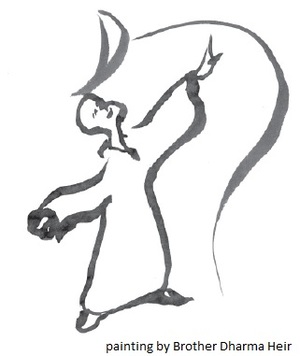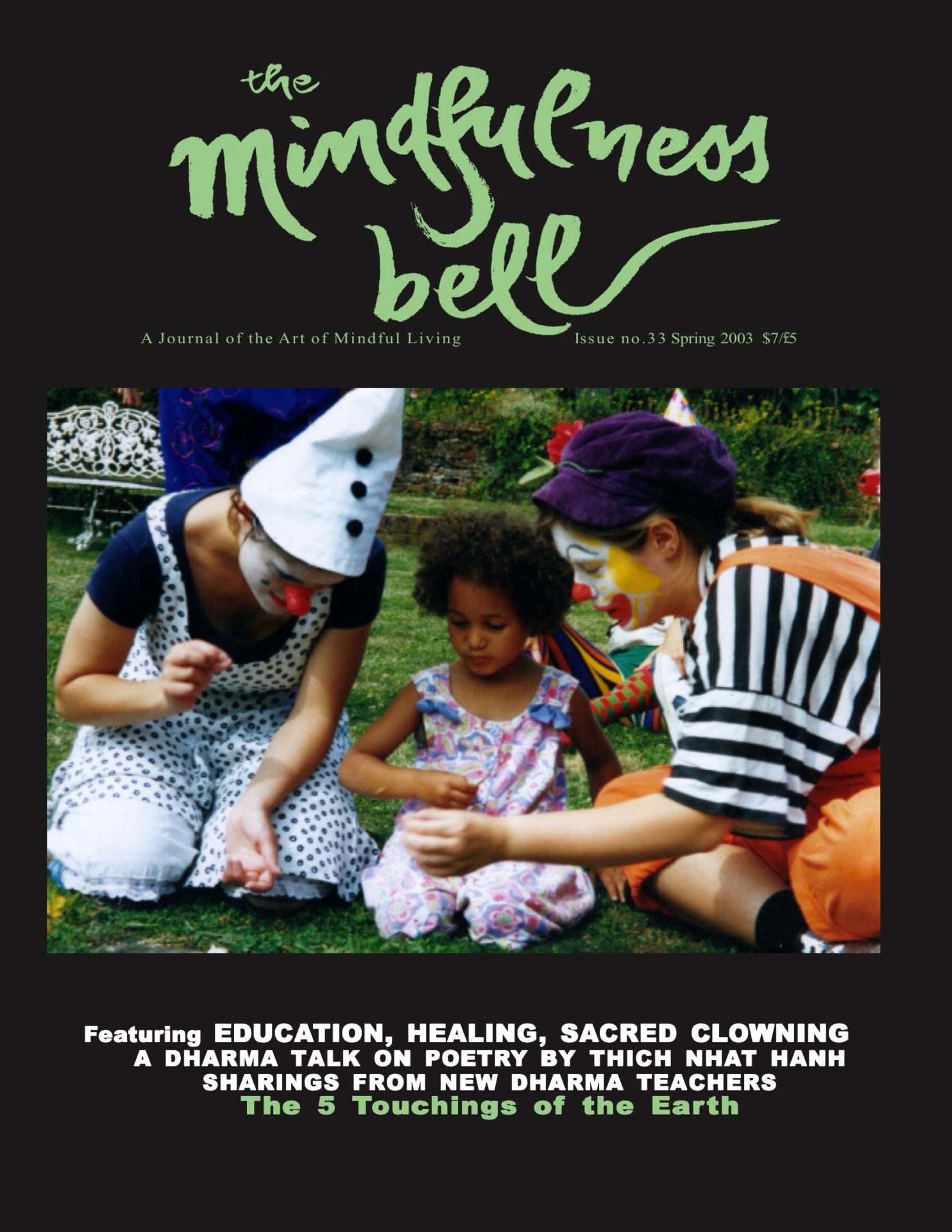By Jane Brockman
When I was first diagnosed with chronic fatigue and fibromyalgia several years ago, I had no idea what a long and difficult road lay ahead of me. At times, when feeling exhausted of every ounce of energy, unable to absorb food, and vulnerable to every kind of illness, I questioned whether it was worth going on. Always, I came back to believing that it was. As I began to direct my energy towards healing,
By Jane Brockman
When I was first diagnosed with chronic fatigue and fibromyalgia several years ago, I had no idea what a long and difficult road lay ahead of me. At times, when feeling exhausted of every ounce of energy, unable to absorb food, and vulnerable to every kind of illness, I questioned whether it was worth going on. Always, I came back to believing that it was. As I began to direct my energy towards healing, mindfulness become an integral part of my journey back to health. I soon realized that in order to truly heal, it would be necessary to bring a deep attention and awareness to every aspect of my life, not only on the physical level, but on the spiritual and emotional levels as well.
I began to be more mindful of the foods I ingested and tend better to the messages my body was giving me. I developed a deeper awareness about my thought patterns, moved towards work that was more in line with my true self and became aware of what brought me joy each day. Deepening my practice of mindfulness has been one of the unexpected gifts of my illness. It has helped me to cope in times when I didn’t think I could go on.
Honoring my Body
First I began to implement major changes to my diet. I’ve always considered myself to be a fairly healthy eater, but I now practice a much deeper level of mindful consumption, as Thay encourages us all to do in the Fifth Mindfulness Training. Over time, I’ve developed a heightened level of awareness concerning the foods I’m allergic to and how my body feels after eating them. Now I can tell almost immediately if my body doesn’t like something. I’ve eliminated many of my favorite foods, as well as sugar, caffeine, wheat, dairy and alcohol. This has demanded an enormous amount of discipline. At first, I thought I’d go crazy without these foods. Yet, as time has gone on, it’s become easier for me to be completely without these substances. I now understand the importance of listening and honoring my body. Breathing in, I honor my body. Breathing out, I smile to my body.
Honoring my body has also meant no longer pushing myself beyond what my strength allows and giving myself permission to rest when necessary. Doing this has been extremely difficult, as I’ve always been an over-achiever and a perfectionist. My illness, however, no longer allows me to live this way. I have had to let things slide. The house doesn’t get cleaned as often. The garden doesn’t get planted. I have to rely on my partner for assistance with the cooking and shopping more. I sleep a lot. I rest a lot. Last year, I stopped working. At times, it has felt like everything is falling apart. My lesson has been to learn to be okay with this and to let go of trying to do everything. It hasn’t been easy, but I know that I’m doing the best I can. Even for those who are healthy, it can be quite liberating to come to terms with being good enough rather than trying to be perfect all the time. As we place a higher priority on our peace of mind than on getting everything done, the result can often be a deeper, more meaningful experience of our lives, our relationships and of ourselves.
Receiving and Letting Go
A most challenging lesson for me throughout this journey has been to practice the art of receiving. At times when I was so incapacitated or when I deeply needed emotional support, it’s been extremely difficult for me to ask others for help. I was raised in a family who valued independence and self-sufficiency and relying on others was not looked upon favorably. Learning to ask for help and to receive from the Universe has been a new lesson. The constant love and support of a caring partner has been a tremendous blessing. I have learned to cultivate a broader network of support—friends and healers who assist me in my journey, including others dealing with chronic fatigue and fibromyalgia. I have also sought out those who have reversed their conditions and brought about their own healing. This has been a source of inspiration and strength for me.
While holding out hope for healing, I have become deeply aware of the importance of surrendering to and accepting my illness. At first, the two seemed contradictory. How could I practice acceptance on one hand and at the same time, work towards healing? As time has passed, I see that I can do both. I see how important it is to be present with what is and to accept fully what is happening in the moment. At the same time I hold a clear image of how I’d like to be. Only in blending the two can I be free.
As I work to practice acceptance, I have certainly felt my share of anger at being sick. There have been times when I felt rage at the limitations I have to deal with because of my illness. I’ve learned that it’s okay to get angry sometimes. In Being Peace Thay tells us to treat our anger with “care, love, tenderness and nonviolence.” The first step is developing an awareness of the anger, according to Thay. We cannot destroy the energy of anger, he points out, yet we can work to convert it to a more constructive energy, like forgiveness, understanding or love. In my own healing journey, I have found that by allowing the anger to surface and by staying with it, I’m eventually able to come to a place of deeper peace and tranquility.
Imagery and Exercise
The use of meditation and imagery has helped enhance my overall sense of peace and tranquility. Guided meditation tapes have become an important part of my daily practice, as lying down is sometimes all I can manage to do. I’ve developed a small collection of tapes which help to release tension in my body and help me to cultivate more positive thought patterns. They have also helped me discover some profound insights and awarenesses about my life and about changes that I need or want to make. In the beginning, I often felt resentful about having to stop in the middle of my day to rest and listen to these tapes. Now,
I look forward to this time of the day. It has become a sacred ritual, a time for quiet and reflection when I can renew and restore, stop, rest and practice mindfulness.
Recently, my intuition has led me to seek out forms of exercise and body-centered therapies which help to balance the mind-body system like yoga, Feldenkrais and T’ai chi. My body has gently given me the message that an increased measure of energy flow would be of much benefit and would assist in my overall feelings of well-being and health. Slowly, I am learning to cultivate a deeper awareness of what is happening in my body in the present moment, sensing into it and asking myself, “How are you feeling right now?”
Sometimes I feel tense, sometimes afraid, sometimes uncomfortable. Next I can proceed to address the messages that my body is giving me, asking myself such questions as: Do I need to set a deadline for an important decision in my life so that my body can relax? Do I need to cut back on my work to balance my life more? Do I need to change the way I react to stress in my life? This practice of having a conversation with my body helps me to anchor myself more in the moment and feel less disassociated from my body.
I’ve begun to look at my professional life with a deeper level of awareness and questioning. I have asked myself: Am I feeling weighted down by the work I am doing? I am also developing more awareness about the kinds of the people I surround myself with. A natural extension of my desire to heal myself has been to seek out individuals who reflect a positive attitude in the world and who also believe in the innate ability of the body to heal itself. About a year ago, I discovered a wonderful naturopath who practices medicine from the standpoint of listening to and following the body’s implicit intelligence. More and more, I have come to trust my intuition when pondering the next stage of healing.

Cultivating Joy
Perhaps one of the most important developments I’ve made during my healing process has been the ability to cultivate a deeper awareness about what brings joy to each day of my life and discovering more ways to bring these activities into my day. At a workshop I attended recently entitled Getting Well Again, a fellow workshop participant shared how important it had been for her to bring more fun into her days. She would frequently ask herself, “Am I having fun? Am I enjoying myself?” I now allow more space in my life for those activities which bring me joy and nurture my spirit—like creative activities, reading, being in nature, spending time with friends, yoga and meditation. Each day I pose the question to myself— What will truly bring joy to this day? And generally, when I’ve taken time to do joyful activities which nurture in a deep way, I find that I’m able to bring more joy to others and to the rest of the world.
Living mindfully with chronic illness has been one of the most difficult challenges of my life. It has been a long and patient journey towards greater overall health and aliveness, a journey marked by many highs and lows as well as a lot of tears. Yet, my journey has not been without its gifts, and I acknowledge these rich blessings with deep gratitude and awareness. I now see what is truly important in life. I am more mindful of how my thoughts and reactions to things affect the health of my body, and I consciously strive to hold more positive mental formations. I give myself permission to rest more. I’m okay with being good enough instead of having to be perfect. And I’m more mindful about what brings joy to each day. As I continue to incorporate mindfulness into more areas of my life, I am watering seeds of peace, joy, freedom and love within myself and within those who surround me.
Jane Brockman lives with her partner, radio personality Eric Alan, and practices with the Community of Mindful Living in Ashland, Oregon.

